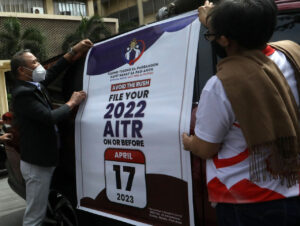




January Economic Update: Growth slows, prices rise
 DOWNLOAD
DOWNLOAD

Inflation Update: Up, up, and away?
 DOWNLOAD
DOWNLOAD

Quarterly Economic Growth Release: Growth takes on a slower pace
 DOWNLOAD
DOWNLOAD


NG budget surplus balloons in April


The National Government’s (NG) budget surplus ballooned to PHP 66.8 billion in April from PHP 4.9 billion a year ago, as revenue growth outpaced expenditures, data from the Bureau of the Treasury (BTr) showed.
This was the first time the government posted a budget surplus — PHP 45.75 billion — since January.
Month on month, the fiscal balance reversed from the PHP 210.261-billion deficit in March.
 In April, revenue collections jumped by 26.66% to PHP 440.7 billion from PHP 347.9 billion a year earlier.
In April, revenue collections jumped by 26.66% to PHP 440.7 billion from PHP 347.9 billion a year earlier.
Tax revenues surged by 31.43% to PHP 403.6 billion.
Bureau of Internal Revenue (BIR) collections surged by 40.24% to PHP 336 billion, as the agency allowed taxpayers to file their value-added tax (VAT) returns on a quarterly basis instead of a monthly basis. The deadline for the filing of VAT returns for the first quarter fell on April 25.
The Bureau of Customs (BoC) collected PHP 67.6 billion in April, up by 2.87% from PHP 65.7 billion a year ago.
On the other hand, nontax revenues fell by 9.2% year on year to PHP 37.1 billion, as BTr revenues declined by 28.89% to PHP 18.3 billion. The BTr attributed this slump to “the base effect of early remittances of dividends from government-owned and -controlled corporations last year.”
Revenues from other offices grew by 24.16% to PHP 18.8 billion.
Meanwhile, government spending rose by 9% year on year to PHP 373.9 billion in April “mainly to the subsidy release to Philippine Health Insurance Corp., larger capital expenditures of the Department of Public Works and Highways (DPWH) and Department of Transportation (DoTr),” the BTr said.
However, the higher expenditure was tempered by a drop in transfers to local government units (LGU) due to their lower share of national tax allotments.
Primary expenditures, which refer to spending net of interest payments, went up by 7.18% to PHP 327.6 billion.
Interest payments jumped by 23.99% to PHP 46.3 billion.
Analysts said the budget surplus was mainly due to a seasonal increase in tax collections.
Tax revenues “kept the balance in surplus given the schedule of filing of returns,” ING Bank N.V. Manila Senior Economist Nicholas Antonio T. Mapa said in a Viber message
“April is the seasonal peak in tax revenue collections and contributed to the budget surplus in some years,” Rizal Commercial Banking Corp. Chief Economist Michael L. Ricafort said in a Viber message.
The BIR’s deadline for the filing of income tax returns fell on April 17 this year.
Mr. Ricafort also attributed the higher budget surplus to disciplined government spending, faster economic growth, and improved tax collections.
Four-month deficit
For January to April, the fiscal deficit narrowed by 34.57% to PHP 204.1 billion from PHP 311.9 billion a year earlier as the expenditure increase slowed.
State spending inched up by 1.33% to PHP 1.46 trillion in the first four months from PHP 1.44 trillion in the comparable period last year.
Primary spending rose by 1.4% to PHP 1.28 trillion, while interest payments edged up by 0.86% to PHP 188.2 billion.
On the other hand, revenues climbed by 11.22% to PHP 1.26 trillion.
Tax revenues rose by 11.78% to PHP 1.12 trillion, which accounted for 89.18% of total collections. BIR collections jumped by 13.31% to PHP 841.2 billion, while Customs revenues grew by 10.68% to PHP 281.4 billion.
Nontax revenues went up by 6.86% to PHP 136.3 billion, as the 23% drop in BTr income to PHP 57.3 billion was offset by a 48.76% increase in revenues from other offices to PHP 79 billion.
Mr. Mapa said the fiscal balance would likely still end in a deficit by December.
“We still expect the country to post a sizeable deficit by yearend although we look for authorities to limit spending to minimize the shortfall. This is in line with fiscal authorities’ efforts for fiscal consolidation,” Mr. Mapa added.
Mr. Ricafort said the government should intensify tax collections and even consider new or higher taxes to improve revenues.
“Fiscal reform measures such as rightsizing of the government and other reform measures to further reduce leakages would help narrow the country’s budget deficit,” he added.
This year, the government has set a budget deficit ceiling of PHP 1.499 trillion, equivalent to 6.1% of the gross domestic product.
The program consists of PHP 3.729 trillion in revenues and PHP 5.228 trillion in disbursements.
As of end-March, the deficit-to-gross domestic product ratio was at 4.84%, lower than the 6.41% in the first quarter a year ago and the 7.33% seen in 2022. — By Luisa Maria Jacinta C. Jocson, Reporter
This article originally appeared on bworldonline.com





 By BusinessWorld
By BusinessWorld